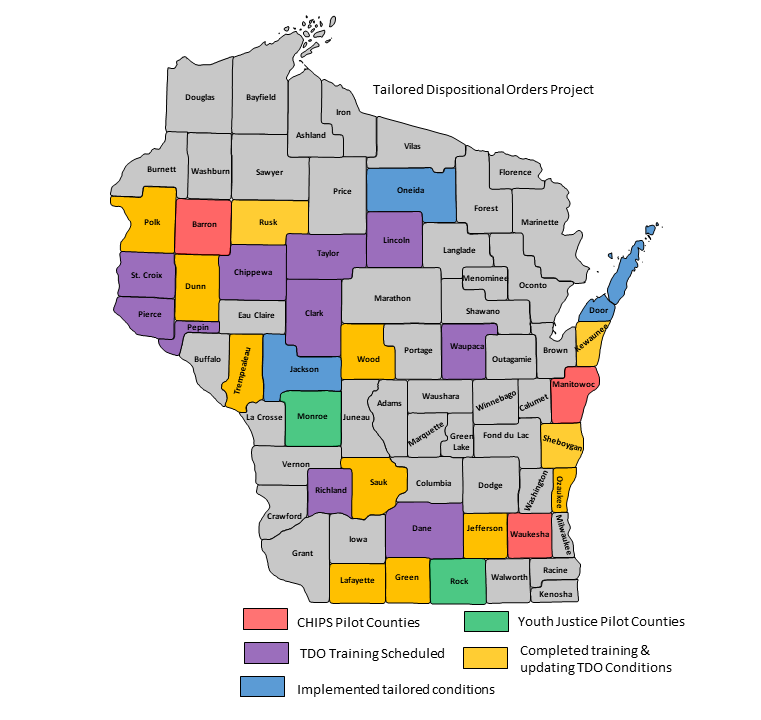The
Tailored Dispositional Orders Project is led by the Children’s Court Improvement Program (CCIP) and the Department of Children and Families (DCF).
The CHIPS Tailored Dispositional Project was piloted in three counties during 2021-22. The project is now being expanded statewide to counties that are interested in improving their CHIPS and Youth Justice conditions.
Counties participating in the project have seen a reduction in the number of conditions, language that is easier for parents and youth to understand, and prioritization of the most important conditions that parents and youth should begin working on first.
About the Project
The project seeks to collaboratively bring together the county agency, court, and legal partners to improve conditions for return and supervision while utilizing
the SMART goals framework.
The project involves a multidisciplinary training with judges, prosecutors, adversary counsel, guardians ad litem, and child welfare professionals.
The CHIPS Tailored Dispositional Orders training provides judges and attorneys with an understanding of how child safety is connected to the conditions for return.
The Youth Justice Tailored Dispositional Orders training explains the Youth Assessment and Screening Instrument (YASI).
Both trainings provide time to begin discussing ways to improve the county’s current conditions.
The goal of the CHIPS project is to reduce the number of cases and improve time to reunification. In CHIPS cases, the project makes changes to the current process by tailoring the conditions for return to focus on the behavior changes that need to be made by the parents to safely return the child to the home, versus a checklist of services.
The goal of the Youth Justice project is to restructure conditions to include positive language and incentives. In Youth Justice cases, the project seeks to reduce the number of conditions while promoting an individualized case plan that highlights behavior changes.

Figure 1: Counties participating in the Tailored Dispositional Orders Project in Wisconsin.
Getting Involved
When a county expresses interest, CCIP and DCF schedules a virtual introductory meeting via Zoom with department supervisors, juvenile judges, the district attorney’s office, and corporation counsel’s office to explain the project, answer any questions, and make sure everyone is on the same page before scheduling a multidisciplinary training.
The CHIPS and Youth Justice Tailored Dispositional Orders multidisciplinary training can either be scheduled together or separately depending on the county’s structure.
All attorneys who handle either CHIPS or Youth Justice cases will be invited to attend.
There is no cost for the training. Continuing education credits are offered to judicial officers, attorneys, and social workers.
At the end of the training, county stakeholders are asked to identify next steps and determine whether they would like CCIP’s and DCF’s assistance, with a follow-up meeting to continue the conversation around improving the language of the conditions.
Information regarding the Tailored Dispositional Orders Project can be found at:
wicciptraining.com/resources or
dcf.wisconsin.gov/cwportal/tailored-dispositional-orders.
Contact
Kristen Wetzel via email for additional information.
